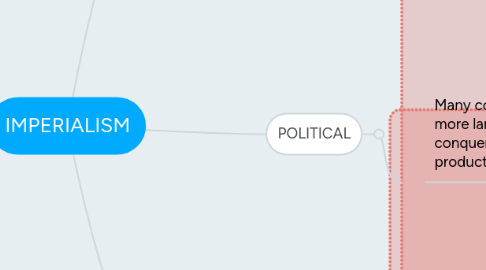
1. POLITICAL
1.1. Many countries wanted to boost their political power, to gain more land and have more power over other countries. They also conquered lands for their strategic location, often for war or products. This is called Geopolitics.
1.1.1. One example of strategic placing of lands were the Ottoman Empire. The lands had easy access to control Mediterranean to Atlantic sea trade. This meant that merchants in landlocked lands had to go through their lands. Russia desperately wanted this land so they tried to get their favor, but it didn't work, so they just waged war on them. This war was called the Crimson War. It took place in 1863.
1.1.2. The Ottomans tried to fight them off, but more and more lands are taken from them and their power is reduced greatly in size. They declined slowly and fell off the map.
2. ECONOMIC
2.1. Resources in different lands lead to other countries wanting those materials so countries usually just conquer that land rather than trading for it.
2.1.1. As European nations industrialized, they searched for new markets and raw materials to improve their economies.
2.1.1.1. Before 1858, India was usually ruled by Britain with no interference in their life, but then Britain restricted India to operate, and they took over. They placed British policies on them so they had to produce raw materials for British manufacturing and they couldn't buy any goods except British goods. India's own handloom textile business was almost put out of business by British textiles. Cheap British cloth undercutted local producers.
2.1.1.1.1. Britain placed railroads in India to trade raw products for other products from other lands.
2.1.2. All colonized people lost all ownership of their own lands. They benefited and were harmed by being colonized, such as gaining railroads, but they lost most if not all of economic and political power. In India, a sepoy mutiny rose when sepoys refused to accept cartridges that were greased with beef and pork fat. Fierce fighting took place among British and sepoy armies.
3. SOCIAL
3.1. Many countries raced for more lands because of a stronger sense of national pride. Europeans, for example, believed that they were better than other peoples. This belief is called racism. They believed that if more of them inhabited the world, then the world would be a better place.
3.1.1. "I contend that we [Britons] are the first race of the world, and the more of the world we inhabit, the better it is for the human race . . . it is our duty to seize every opportunity of acquiring more territory and we should keep this one idea steadily before our eyes that more territory simply means more of the Anglo-Saxon race, more of the best, the most human, most honourable race the world possesses." - Cecil Rhodes, Confession of Faith, 1877
3.1.2. Usually colonized people were treated like third rate citizens even in their own land. Many of them did not like this, because their conquerors believed they were the better race just because their color was different. Many of them resented the constant racism.
3.2. Another cause of imperialism was Social Darwinism. Social Darwinism is the belief that it is the fittest of survival were considered wealthy so they were superior than others.
3.2.1. This belief lead to Europeans believing that non-Europeans were on a lower scale than them because they had less technological advancements than them. Europeans believed they had the right to bring their advancements to other countries.
3.2.2. Colonized people were taken over because of the advancements that Europeans had overwhelmed them, like in Africa.
